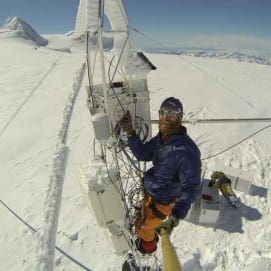
Deserts are not static. In a way, they’re like living things, expanding and shrinking with the passage of time, their borders always moving and changing. This is a perfectly natural process, and is usually not a problem. However, recent years have introduced a new and worrying issue: the world’s deserts are growing too much, too quickly.
This phenomenon, known as “desertification,” could have serious and lasting consequences around the world. While arable land outside of deserts can supply most of the world’s current nutritional needs, deserts themselves are not the best environments in which to grow food. Deserts receive little precipitation throughout the year, making it a challenge to achieve agricultural abundance in those regions. As desertification increases, the effect it has on the world’s food supply could become telling.
Want to learn a little more? Here’s a look at the problem, and the reasons why students in environmental schools work to fight it.
Students at Environmental Science Schools Understand the Global Nature of Desertification
Desertification, at its core, is largely a manifestation of the unsustainable practices humanity uses when consuming natural resources. Overgrazing and overcultivating land, clear-cutting forests, interference with water systems, and other negative practices can all contribute to the expansion of deserts.
Part of the trouble with this phenomenon is that all of the above practices are practiced to one degree or another all over the planet. This means there’s really no region of the world that is immune to desertification – particularly as global warming causes average temperatures to rise across the globe.
The effects of desertification are substantial. Already, some previously habitable and somewhat productive regions of the planet have been rendered uninhabitable by the process, and much more territory is thought to be at risk. One study estimates that 38 per cent of the world’s land is composed of arid regions that are vulnerable to desertification.
Unfortunately, coming as it is in the middle of many other environmental problems, desertification may find itself fighting for the public recognition necessary for decisive action to be taken against it. Students preparing for environmental studies careers who want to help may need to employ their training in communication and community leadership to inform the public and encourage that necessary steps be taken.
Acquiring a Professional Science Master’s Can Help You Find a Solution
The good news is that it is possible to slow and stop desertification around the world. The bad news is that doing so will be quite the challenge.
There are many actions that can be undertaken to help end desertification. A few examples include improving land and water management systems, protecting vegetation in at-risk areas, cycling agricultural activity to reduce nutrient depletion, and empowering local communities to manage resources more effectively. Most likely, a region will need to implement more than one of these measures to prevent its land turning to desert, and as they all require investments of time and money, this means getting them properly planned and completed will require a rare kind of expertise.
Want to become somebody who can help deliver the solution to desertification? Studying in a professional science master’s program can provide you with the tools necessary to get the job done. At a top school like Unity College, students of sustainability learn how to conduct analysis of economic, ecological, and cultural systems. This can help them gain great insight into problems like desertification that represent a challenge to all three, and to create predictive computer models to evaluate potential solutions.
As with most ecological problems, there is no miracle solution to desertification, and economic and cultural barriers to implementing the many small steps necessary for ending the problem. Students in environmental training, however, are as well-positioned as can be to halt desertification once and for all.
Do you want to learn more about how students at environmental science schools protect the environment?
Contact Unity College to find out!



